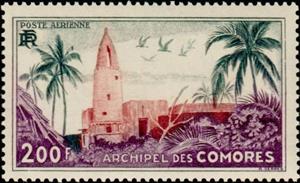Stamp: Anjouan: Mosquee d'Ouani-Anjouan: Mosque of Ouani (Comoros 1953)
Anjouan: Mosquee d'Ouani-Anjouan: Mosque of Ouani (Comoros 1953)
15 January (Comoros ) within release Site goes into circulation Stamp Anjouan: Mosquee d'Ouani-Anjouan: Mosque of Ouani face value 200 Comorian franc
| Stamp Anjouan: Mosquee d'Ouani-Anjouan: Mosque of Ouani in catalogues | |
|---|---|
| Michel: | Mi:KM 34 |
| Yvert et Tellier: | Yt:KM PA3 |
Stamp is square format.
Poste aerienne-AirmailStamp Anjouan: Mosquee d'Ouani-Anjouan: Mosque of Ouani it reflects the thematic directions:
Mosquitoes, the Culicidae, are a family of small flies consisting of 3,600 species. The word mosquito (formed by mosca and diminutive -ito) is Spanish and Portuguese for little fly. Mosquitoes have a slender segmented body, one pair of wings, three pairs of long hair-like legs, and specialized, highly elongated, piercing-sucking mouthparts. All mosquitoes drink nectar from flowers; females of some species have in addition adapted to drink blood. The group diversified during the Cretaceous period. Evolutionary biologists view mosquitoes as micropredators, small animals that parasitise larger ones by drinking their blood without immediately killing them. Medical parasitologists view mosquitoes instead as vectors of disease, carrying protozoan parasites or bacterial or viral pathogens from one host to another.
